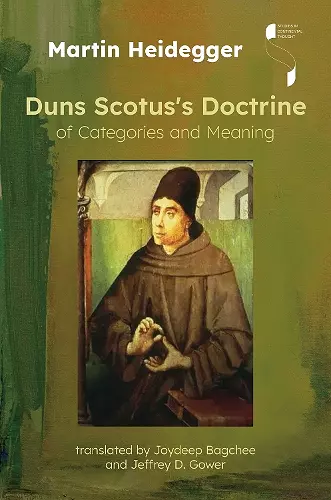Duns Scotus's Doctrine of Categories and Meaning
Martin Heidegger author Joydeep Bagchee translator Jeffrey D Gower translator
Format:Hardback
Publisher:Indiana University Press
Published:12th Jul '22
Should be back in stock very soon

Duns Scotus's Doctrine of Categories and Meaning is a key text for the origins of Martin Heidegger's concept of "facticity." Originally submitted as a postdoctoral thesis in 1915, it focuses on the 13th-century philosopher-theologian John Duns Scotus.
Heidegger first analyzes Scotus's doctrine of categories, then offers a meticulous explanation of the Grammatica Speculativa, a work of medieval grammar now known to be authored by the Modist grammarian Thomas of Erfurt. Taken together, these investigations represent an early foray into Heidegger's lifelong philosophical concerns, "the question of being in the guise of the problem of categories and the question of language in the guise of the doctrine of meaning."
This new and unique translation of one of Heidegger's earliest works offers an important look at his early thinking before the question of being became his central concern and will appeal to readers exploring Heidegger's philosophical development, medieval philosophy, phenomenological interpretations of the history of philosophy, and the philosophy of language.
"Heidegger's early engagement with medieval philosophy via neo-Kantian logic foreshadows his later explorations of being, truth, and meaning. He concludes by challenging himself to grapple with "historical spirit." Bagchee and Gower's meticulous translation brings this formative phase of Heidegger's thought to English-speaking readers."—Richard Polt, Xavier University
"Heidegger's Habilitationsschrift, submitted to the University of Freiburg in 1915, at the age of twenty-six, takes up themes central to scholastic ontology and logic: the categories of reality and the differentiations of meaning. Quite traditional topics, these are not themes that one might suspect would help open the way to the revolutionary work of 1927, Being and Time. And yet: here one sees the phenomenological gifts already at work in the young Heidegger. Here one finds the early formulations of the hermeneutics of facticity and the first hints of the notion of formal indication – one finds the earliest signs of the revolutionary work to come. Ably translated, this text offers insights into key problems of scholasticism as well as into the genesis of the philosophical revolutionary that Heidegger would soon become."—Dennis Schmidt, Western Sydney University
"With this careful and scholarly translation of Heidegger's postdoctoral thesis, Bagchee and Gower have provided an indispensible resource for anyone seeking to understand the trajectory of Heidegger's early thinking. A splendid achievement."—William McNeill, DePaul University
ISBN: 9780253062642
Dimensions: unknown
Weight: 531g
228 pages